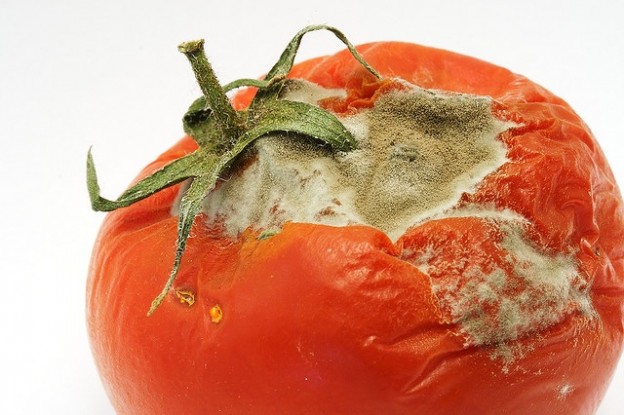When I lived in the world’s 125th richest country, my most fervent desire on returning to the United States would be to go to the grocery store. Aisle upon aisle of products in eye-catching boxes, bottles and bags; a vast selection of jewel-toned meats; piles of produce in a cacophony of colors. The abundance—there are almost 39,000 items in the average supermarket—awed me. Tomatoland, the new book by James Beard Award-winning author Barry Estabrook, unravels the cost—environmental, culinary and human—of producing just one of the foods sold in our “cathedrals to consumerism.”
The story starts with a business decision, made for the usual reasons (cost, location, stupidity) with far-reaching consequences. To cater to the burgeoning East Coast winter tomato market, a pack of New Yorkers bought up cheap but barren land in southwestern Florida. The sandy region couldn’t have been less suited to growing tomatoes, and as a consequence, the industry developed an 8 million pounds a year pesticide habit. The few Solanum lycopersicum varieties—there are over 7000 more, both domestic and wild—grown there were selected not for their superior taste, but for their appearance, uniformity and willingness to travel. The final insult: To sell the fruit at the prices we consumers expect—and ones that aren’t an easy target for competition from our vecino to the south (and here I wish the book had made a short road trip), the crop is harvested by migrant workers, paid a pittance.
The bulk of Tomatoland describes the living and working conditions of those laborers, mostly Mexican and Central American, and their struggle to achieve even the smallest changes in an agricultural system that is always harsh and often abusive. There are some truly horrifying parts: a microcluster of deformed babies, born to mothers who worked in pesticide-laden fields late into their pregnancies; a pollero (coyote) who imprisons his illegals in a foul, waste-strewn box truck; cold-hearted murders to warn modern-day slaves about what can happen to those who flee. And some uplifting ones: the moment when 600 field workers spontaneously converge on a company president’s house to protest the beating of a 16-year-old boy, the “Boot the Bell” campaign that ejects 22 Taco Bells from campuses nationwide for refusing to increase pay for laborers by a penny a pound, and portraits of four do-gooders, presumably the way forward for the Florida tomato industry and the Immolakee farmworkers.
It is this final, future-oriented section that is the weakest of the book. “The Lawyer,” “The Teacher” and “The Builder” all do admirable work. Attorney Gregory Schell is a legal advocate, fighting for fair compensation, safe working conditions and decent accommodations. Barbara Mainster runs a daycare and early childhood education system that serves 8000 children for free or at low cost. And Steve Kirk has built good quality housing for 6500 farmworkers and their families through his Everglades Farmerwork Village and Rural Neighborhoods nonprofit. But these supports, and other services not mentioned such as healthcare (at $1,629 per uninsured person in 2004), all cost money. And that money comes largely from taxpayers in the form of direct financing, grants and low-interest loans. Roll that together with the direct and indirect subsidies that benefit industrial agriculture and suddenly those $3.99/lb winter tomatoes start looking mighty expensive. Nonprofits and corporations acting on an ad-hoc basis aren’t the solution to such a large and intractable problem; government is.
It’s a testament to Estabrook’s clear writing and careful research that the story of the Immokalee farmworkers reads effortlessly, like one you already know. In part, this is because we’re now aware of a litany of ills that stem from the way we eat: poor human health, mistreatment of animals, environmental pollution, food safety problems, dependence on fossil fuels and chemicals, cynical and deceptive marketing, dwindling biodiversity and shortsighted land use. Add labor abuses to the list. The challenge of the 21st century will be to find a way to incorporate all this knowledge into our food system so that conscious consuming isn’t a lifestyle choice, but the norm.
Anastacia Marx de Salcedo posts monthly on PRK for Slow Food Boston.

